Unit 1 What’s the matter?词汇课件 (共63张PPT)人教版英语八年级下册
文档属性
| 名称 | Unit 1 What’s the matter?词汇课件 (共63张PPT)人教版英语八年级下册 | 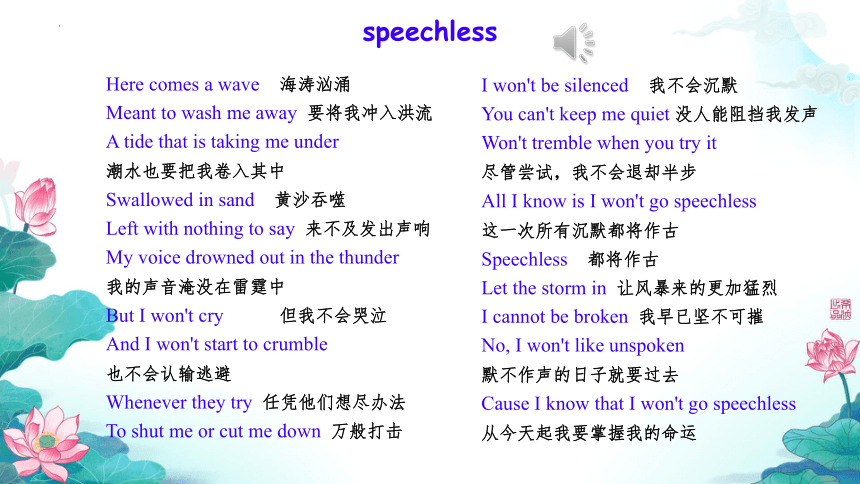 | |
| 格式 | pptx | ||
| 文件大小 | 10.9MB | ||
| 资源类型 | 教案 | ||
| 版本资源 | 人教新目标(Go for it)版 | ||
| 科目 | 英语 | ||
| 更新时间 | 2025-01-02 19:12:14 | ||
图片预览

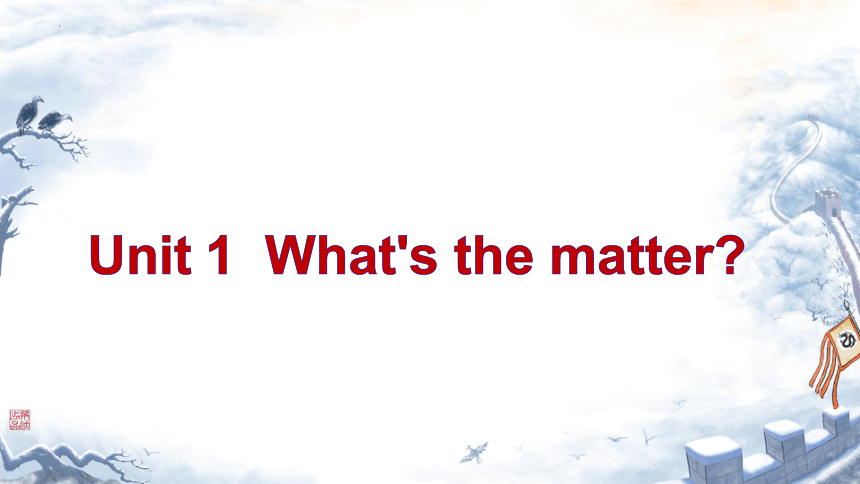
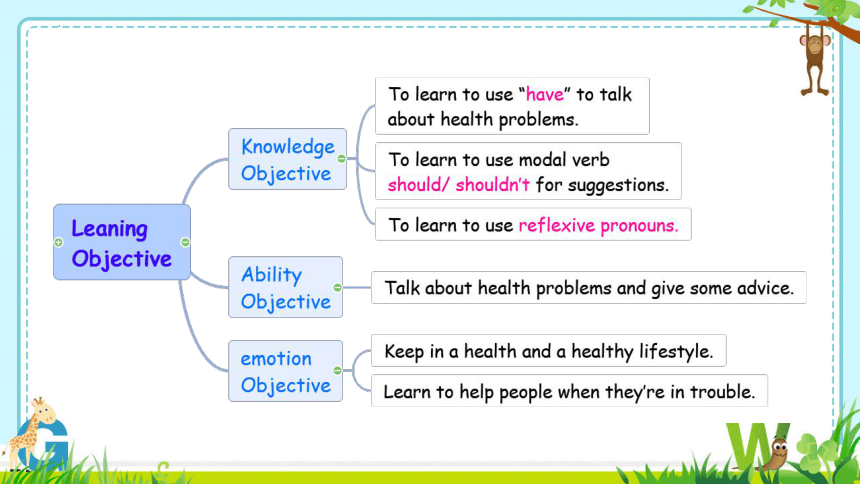
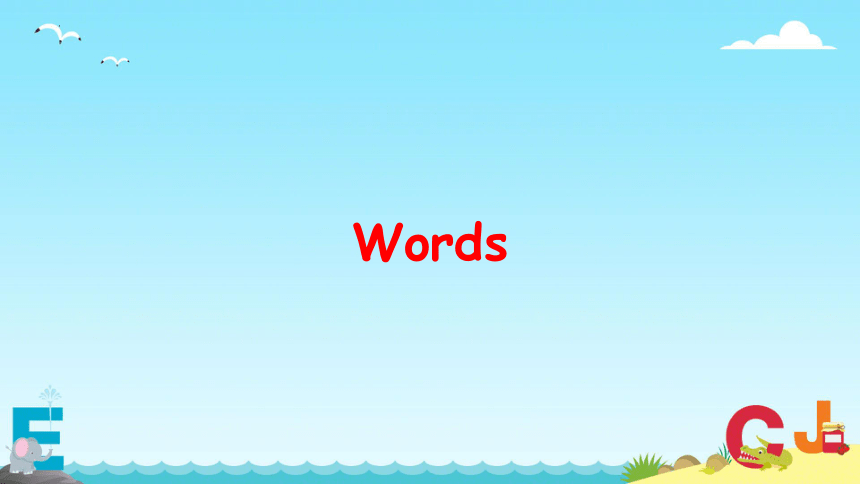
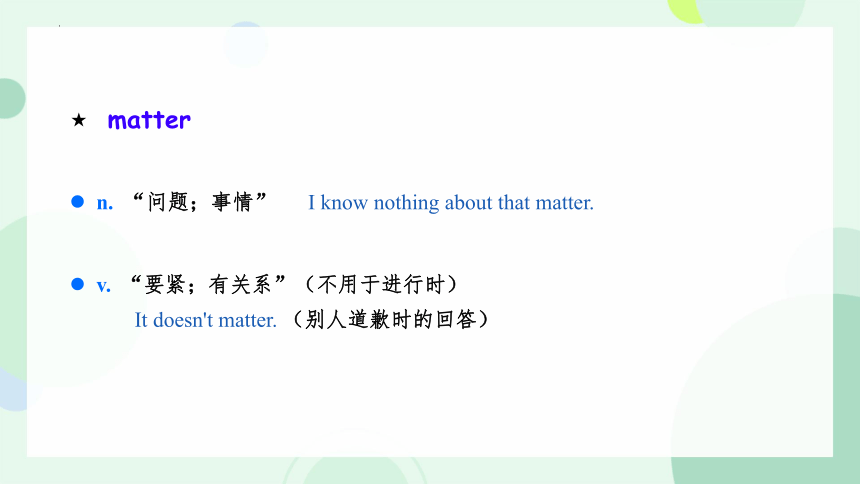

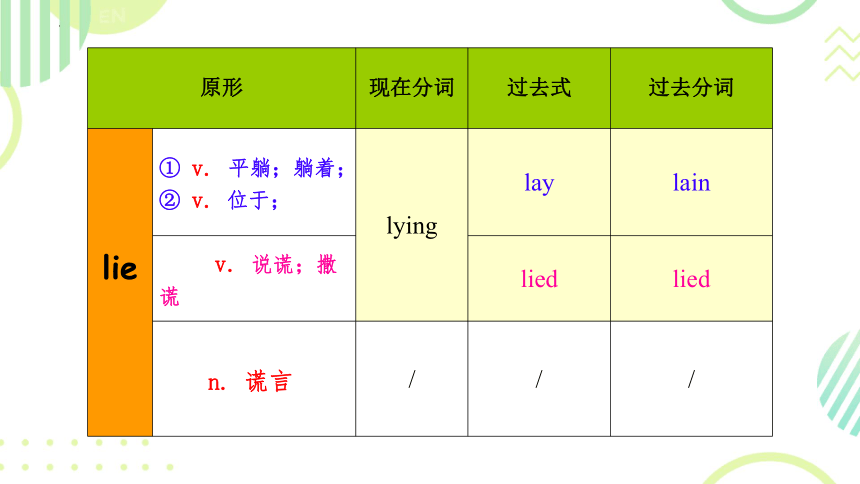
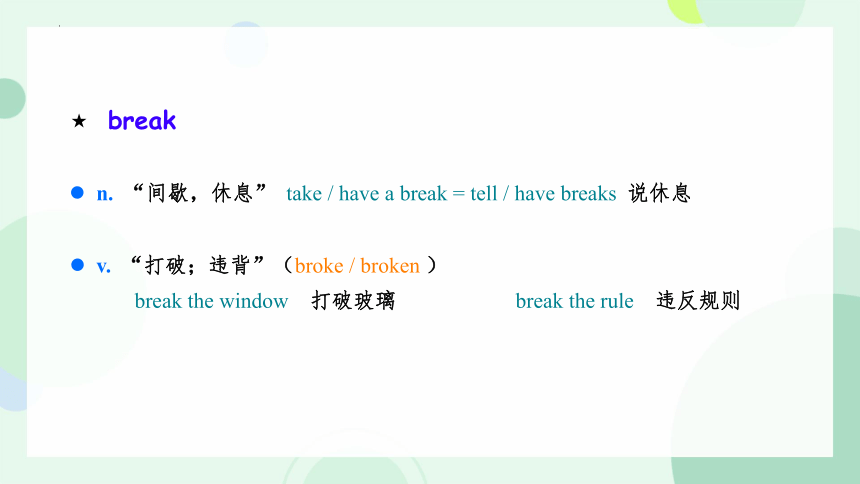

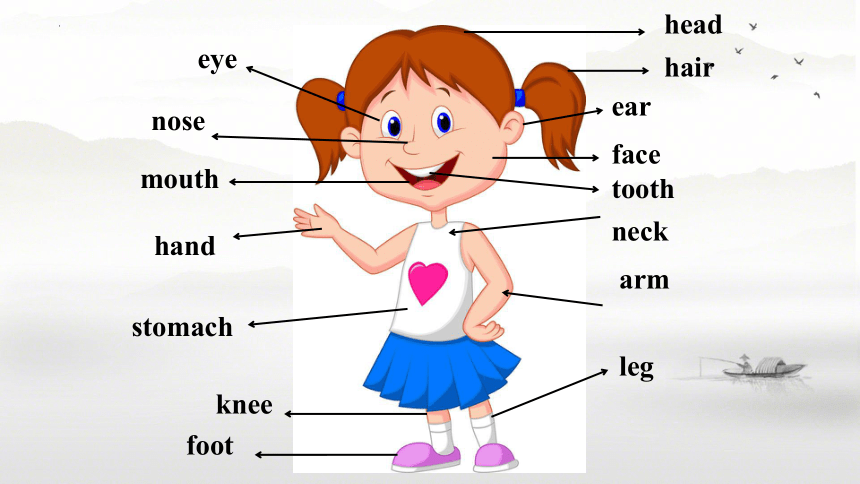
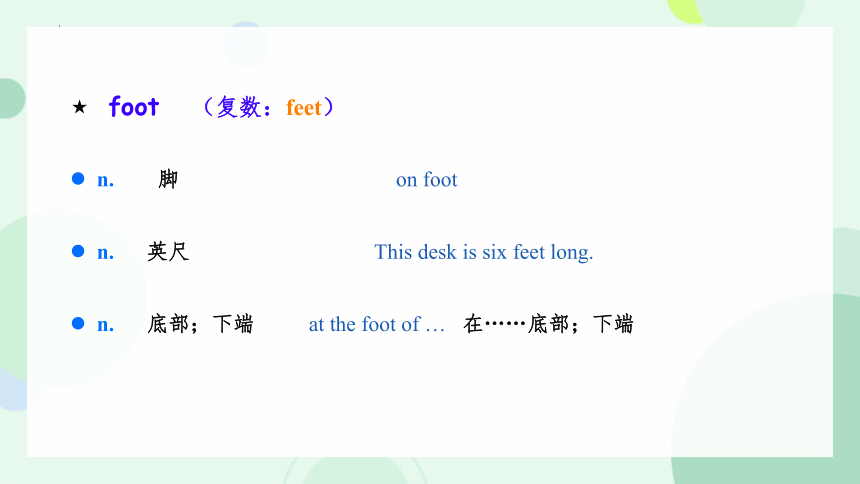
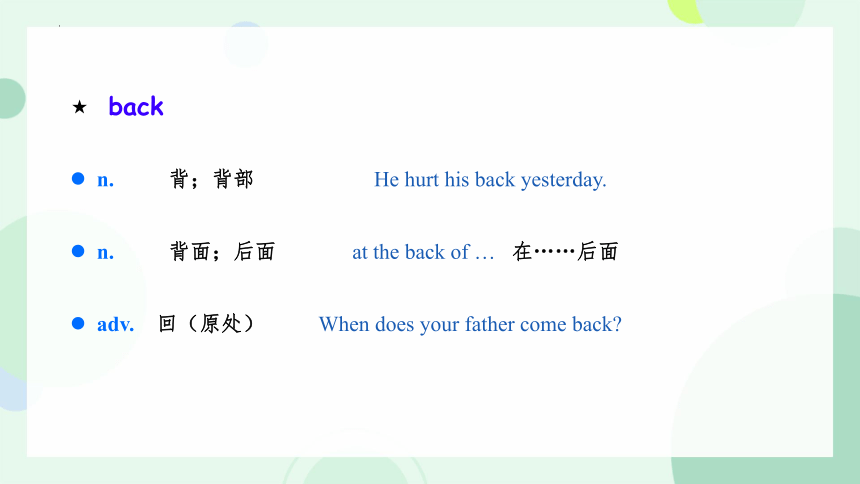
文档简介
(共63张PPT)
speechless
Here comes a wave 海涛汹涌
Meant to wash me away 要将我冲入洪流
A tide that is taking me under
潮水也要把我卷入其中
Swallowed in sand 黄沙吞噬
Left with nothing to say 来不及发出声响
My voice drowned out in the thunder
我的声音淹没在雷霆中
But I won't cry 但我不会哭泣
And I won't start to crumble
也不会认输逃避
Whenever they try 任凭他们想尽办法
To shut me or cut me down 万般打击
I won't be silenced 我不会沉默
You can't keep me quiet 没人能阻挡我发声
Won't tremble when you try it
尽管尝试,我不会退却半步
All I know is I won't go speechless
这一次所有沉默都将作古
Speechless 都将作古
Let the storm in 让风暴来的更加猛烈
I cannot be broken 我早已坚不可摧
No, I won't like unspoken
默不作声的日子就要过去
Cause I know that I won't go speechless
从今天起我要掌握我的命运
Unit 1 What's the matter
Words
matter
n. “问题;事情” I know nothing about that matter.
v. “要紧;有关系”(不用于进行时)
It doesn't matter. (别人道歉时的回答)
lie
v. “躺,平躺” (lay / lying ) He found a dog lying at a door.
v. “位于;处于”(lay / lying ) Qingdao lies in the east of Shangdong.
v. “撒谎;说谎”(lied / lying ) lie to sb. 对某人说谎
n. “谎言,假话”(liar n. 说谎的人 ) tell a lie = tell lies 说谎
拓展:lay
v. “产(卵),下蛋;放置,安放” (laid / laying )
The hen laid an egg. He laid the plates down gently on the table.
原形 现在分词 过去式 过去分词
lie ① v. 平躺;躺着; ② v. 位于; lying lay lain
v. 说谎;撒谎 lied lied
n. 谎言 / / /
break
v. “打破;违背”(broke / broken )
break the window 打破玻璃 break the rule 违反规则
n. “间歇,休息” take / have a break = tell / have breaks 说休息
hit
v. “碰撞;(用手/器具击;打) ”
hit sb. on / in the +身体部位名词 (当所打部位较硬,如head / nose / back,
用on;当所打部位较硬,如eye / mouth / face等,用in;)
v. “打击;袭击”(lied / lying ) She hits at him.
n. “打击;成功;红极一时的人” She became a hit at that time.
head
leg
eye
ear
mouth
neck
nose
foot
tooth
hand
stomach
arm
Let's learn!
hair
face
knee
foot (复数:feet)
n. 脚 on foot
n. 英尺 This desk is six feet long.
n. 底部;下端 at the foot of … 在……底部;下端
back
n. 背;背部 He hurt his back yesterday.
n. 背面;后面 at the back of … 在……后面
adv. 回(原处) When does your father come back
1. arm in arm hand in hand
2. back to back face to face / nose to nose
heart to heart shoulder to shoulder
4. Two heads are better than one.
3. neck and neck
臂挽臂
手拉手
背靠背
面对面
心贴心
肩并肩
并驾齐驱
三个臭皮匠胜过诸葛亮
Let's play: Touch my ….
A: What’s the matter / trouble / problem
with you
B: I have a cold.
have a cold
Look and say
He __________.
has a cold
主语+ have / has + a / an +疾病.
have a stomachache
He _____________.
has a stomach
A: What’s the matter / trouble / problem with him
B: He has a stomach. /
Something is wrong with my stomach. /
There is something wrong with my stomach.
1. 主语+ have / has + a / an +身体部位-ache.
2. Something is wrong with sb's 身体部位. /
There is something wrong with sb's 身体部位.
A: What’s the matter / trouble / problem
with you
B: I have a cold.
have a sore back
He .
has a sore back
主语+ have / has + a sore +身体部位.
ache n. 疼痛 v. 疼痛;渴望 ache 指持续的隐隐的疼痛,常作词后缀放在身
体部位名词后构成病痛名称
I have a toothache.
sore adj. 疼痛的;酸痛的 sore 通常指由于发炎而引起的肌肉疼痛,表示
身体部位疼痛时,放在身体部位名词前。
I have a sore back.
hurt v. 疼痛;受伤 hurt 表示身体部位感到疼痛。
My left leg hurts. I hurt myself.
pain n. 痛苦;刻苦;令人厌烦 v. 使…痛苦;使…烦恼 pain 可指一般疼痛,也可指剧痛;疼痛可以是
局部/全身,时间可长可短;也可引申指精
神上的痛苦。have a pain in / on the+身体部位
1. What's the matter (with sb.) (人称代词宾格)
2. What's the trouble (with sb.)
3. What's the problem (with sb.)
4. What's wrong (with sb.)
5. What happened (to sb.)
6. What's up (with sb.)
7. Is there anything wrong (with sb.)
8. Are you OK
询问某人患了何病/遇到了何种麻烦:
拓展:
Tip:
当只想表达关心,询问对方身体情况时,不要在What’s the matter之后加with you,因为What’s the matter with you 也带有责怪或者不理解之意,可能会引起误解。
1. 主语+have / has + a / an +疾病.
2. 主语 +have / has + a / an +身体部位-ache.
3. 主语 +have / has + a sore+身体部位.
4. 主语 +hurt(s)+身体部位/反身代词.
5. Something is wrong with +sb.'s身体部位.
6. There is something wrong with+sb.'s身体部位.
表达不舒服:
拓展:
Advice
A: I have a toothache. What should I do
B: You .
A: I have a stomachache. What should I do
B: You ____________________
should lie down and rest.
need to see a dentist
Make a conversation.
A: What's wrong / the matter / the trouble / the problem with …
B: 主语+have / has a / an … What should + 主语+do
A: 主语+should …
情态动词
should:
1. 意为“应当;应该”,后+V-原型;
2. 否定形式:shouldn't
用法:
1. 表示意见/建议: You should drink some water.
2. 表示义务/责任: We should study hard.
3. 表示命令/责备/要求(语气比较强烈):He shouldn't be careless.
4. 表示推测/可能性:They should be teachers.
5. 表示征询意见(用于主语为第一人称的疑问句中):
Should we tell her about it
情态动词should,表劝告/建议,责任与义务;
还有第一人称问句中,表征询意见要记清。
She should take some medicine.
否定句:
What should she do
一般疑
问句:
肯定回答及
否定回答:
划线提问:
She shouldn't take any medicine.
Should she take any medicine
Yes, she should. / No, she shouldn't.
1. 定义:又叫自身代词,表示反射或强调自身的代词,即动作的发出者将动
作反射到自己身上,“……自己”。 I have to do it by myself.
反身代词:
2. 含有反身代词的相关短语:
enjoy oneself = have fun = have a good / great / nice time 玩得开心/愉快
hurt / cut oneself 伤/割着自己 help oneself to sth 随便吃喝些……
believe in oneself 相信自己 lose oneself in 迷恋/沉醉于
by oneself 独自/单独 teach oneself = learn sth by oneself 自学……
look after oneself = take care of oneself 照顾自己
say to oneself 自言自语 introduce oneself 自我介绍
人称代词大家族
第一人称 第二人称 第三人称
单数 复数 单数 复数 单数
复数
主格 I we you you he / she / it they
宾格 me us you you him / her / it them
形代 my our your your his / her / its their
反身代词 myself ourselves yourself yourselves himself / herself / itself themselves
用法:
1. 作宾语:反身代词常在teach / enjoy / help / hurt /
look after等词后作宾语。
The boy is old enough to look after himself.
反身代词表自身,
可作宾/表/同位三成分;
动/介身后作宾语,
系动词后作表语;
句中强调是同位,
屈身主宾身后蹲。
2. 作表语:反身代词放在be / feel / seem / look 等词
后作表语用来描述身体感觉/精神状态。
Just be yourself.
3. 作同位语:反身代词常作主语/宾语的同位语,
用来加强语气。 Miss Leigh herself is a teacher.
You should go and ask Jim himself.
Fill in the blanks with the reflexive pronouns.
Yesterday my sister Tonia and I went to the shop to buy (1) ________ some ice-cream. On the way home, Tonia fell down and hurt (2) ________ and I cut (3)________ on some broken glass. When we got home, my brother and his friends were enjoying (4) ___________ playing in the garden. My brother shouted, “Look at (5) __________”, and he began to laugh at us. I couldn’t know why. When we looked at (6) ________ in the mirror, we saw why. Our faces were covered with ice-cream.
ourselves
herself
myself
themselves
yourselves
ourselves
She talked too much yesterday and didn't drink enough water. (1c)
too much ① adv. “……得太多”,修饰动词
It 's bad for your eyes to watch TV too much.
② adj. “太多”,修饰不可数名词 There is too much water on the floor.
辨析:too much / too many / much too
too many adj. “太多”,修饰可数名词 Too many people visit him every day.
much too adv. “太……”,修饰adj. / adv. The coat is much too expensive.
enough
① adj. “足够的;充足的”,修饰名词,放在名词前
You'll have enough time to have a rest.
② adj. “足够地;充分地”,修饰形容词/副词,放在形容词/副词后
It's warm enough in the room. He runs quickly enough.
拓展:
enough for sb. to do sth. (某人/某物)足够……做某事
= so … that … 如此……以至于
The box is light enough for the boy to carry.
= The box is so light that the boy can carry it.
drink some hot tea with honey (2b)
with prep.
① “具有,带有”,表示事物具有的特征/性质(反义词:without,“没有”)
China is a country with a long history.
② “和……一起” Mr. Black is talking with a friend.
③ “使用” She cut the apple with a knife.
③ 表示行为方式 She likes to sleep with a light on.
Dialogue
Lisa’s health
problems
Reason
Mandy’s advice
She has a .
She can’t .
She for too long without moving.
1. .
2. .
3. .
headache
move her neck
sat in the same way
take breaks away from the computer
lie down and rest
go to a doctor
Watch the video and fill in the form.
Translate the following phrases into Chinese.
1. have a headache
2. move my neck
3. take my temperature
4. all weekend
5. away from the computer
6. in the same way
7. without moving
8. go to a doctor
头疼
活动脖子
量体温
整个周末
远离电脑
以同样的姿势/方式
没有活动
去看医生
Role-play the conversation.
Mandy: Lisa, are you OK
Lisa: I have a headache and I can’t move neck. What should I do
Should I take my temperature
Mandy: No, it doesn’t sound like you have a fever. What did you do on the weekend
Lisa: I played computer games all weekend.
Mandy: That’s probably why.You need to take breaks away from the computer.
Lisa: Yeah, I think I sat in the same way for too long without moving.
Mandy: I think you should lie down and rest. If your head and neck still hurt tomorrow,
then go to a doctor.
Lisa: OK. Thanks, Mandy.
2d
Lisa feels very bad. She played computer games ___________. So she _____________ and _________________. She doesn’t need to _________________. Instead, she needs to ___________ away from the computer. She should _______ and rest. If her head and neck still hurt, she should _____________.
all weekend
can’t move her neck
take her temperature
take breaks
lie down
go to a doctor
has a headache
Language Points
1. You need to take breaks away from the computer.
need
① 实义动词,“需要”(有形式变化:needs / needed)
1) need sth. “需要某物”, She needs a good rest.
2) need to do sth. “需要做某事”, Do I need to take my temperature
3) need doing = need to be done “需要被做”, (表示被动意义,主语为物)
The room needs cleaning. = The room needs to be cleaned.
② 情态动词,“需要”(无形式变化,后+V-原)
-- Need I finish the work today -- Yes, you must. / No, you needn't.
③ n.“需要”
need for … 对……的需要 There's a growing need for new houses in many areas.
be in need of … 需要…… I'm in need of some fresh air.
in need 有需要的;处于困境的 We should help people in need.
if conj. “如果;假如”,引导条件状语从句。在含有if引导的条件状语从句的主从复合句中,如果主句是祈使句/主句谓语含有情态动词/主句用一般将来时,if从句用一般现在时表将来,即“主将从现”。
2. If your head and neck still hurt tomorrow,then go to a doctor.
If you have a sore throat,drink more water with honey.
If you have a toothache,you should go to the dentist.
If it doesn't rain, we'll go for a picnic this weekend.
Passage
Bus Driver and Passengers
Save an Old Man
Predict what happened in the story and think about the following questions, according to the picture and the title.
1.What happened to the man lying
by the road
2.Did the man die
3.Who do you think is going to save
the man
Pre -reading
4.If you see an old man lying on the
side of the road, will you help him
Why or why not
Skimming (略读)
It means you have to “read between the lines ”to get the meanings.
While Reading
1. Do you think it comes from a newspaper or a book
2. How do you know
I think it comes from a newspaper.
It is reporting sth. that happened very recently, and the whole story is very short.
At 9:00 a.m. yesterday, bus No. 26 was going along Zhonghua Road when the
driver saw an old man lying on the side of the road. A woman next to him was
shouting for help.
When
where
Who
What
过去进行时
Beginning:
Read carefully (细读)
引导时间状语从句
The bus driver, 24-year-old Wang Ping, stopped the bus without thinking twice. He got off and asked the woman what happned. She said that the man had a heart problem and should go to the hospital. Mr. Wang knew he had to act quickly. He told the passengers that he must take the man to the hospital. He expected most or
all of the passengers to get off and wait for the next bus. But to his surprise, they all agreed to go with him. Some passengers helped Mr. Wang to move the man onto the bus.
再三考虑
复合形容词,在n前作定语
Thanks to Mr. Wang and the passengers, the doctors saved the man in time.
" It's sad that many people don't want to help others because they don't want any
trouble," says one passenger."But the driver didn't think about himself. He only
thought about saving a life.
Ending:
Reusult
View
Who
How
When
Where
What
Why
Bus driver / passengers /
a woman / an old man
Zhanghua Road
the man had a
heart problem
the doctors saved the man in time
At 9:00 a.m. yesterday
An old man was lying on the side of the road.
新闻六要素(5W&1H)
Discussion:
1. Do you agree that people often do not help others because they do not want to get into trouble
Why or why not
2. Why did the writer write this story What did the
writer want to tell us
Post Reading
1. go along=go down 沿着...走,前进
2. be doing sth when 正在做某事时,突然
3. on the side of (the road / ...) 在(马路/……)边
4. without doing 没有做某事
5. think twice 再三考虑
6. think about 考虑,思考
7. save a life 拯救一条生命
8. right away = right now = in a minute 立即;马上
Phrases:
Language Points
辨析:see sb. doing sth. 与 see sb. do sth.
1) see sb. doing sth. “看见某人正在做某事”,强调看见某个动作正在进行
We saw him crossing the road.
1. At 9:00 a.m. yesterday, bus No.26 was going along Zhonghua Road when the driver saw an old man lying on the side of the road.
2) see sb. do sth. “看见某人做了某事”,强调看见动作发生的整个过程或看
见动作经常发生 We saw him cross the road.
拓展:类似 see 用法的动词
watch / hear / notice sb. do sth. 看见/听见/注意到某人做了某事
watch / hear / notice sb. doing sth. 看见/听见/注意到某人正在做某事
happen 强调事情发生的偶然性
1) v.“发生”① Sth. happen(s)+地点/时间“某地/某时发生某事”
An accident happened in that street. The story happened in 2008.
2. He got off and asked the woman what happened.
② Sth. happen(s) to sb. “某人发生了某事” Great changes happened to me.
2) v.“碰巧”① Sb. happen(s) to do sth. “某人碰巧做某事”
She happened to meet her friend in the bookstore.
= It happened that she met her friend in the bookstore.
② It happens that从句 “碰巧”(两个结构可进行同义句转换)
except ① except sb. to do sth.“预料/期待某人做某事”
I except him to buy me a present.
3. He expected most or all of the passengers to get off and wait for
the next bus.
② except to do sth.“预料/期待做某事” I expect to be back within a week.
③ except that从句 “预料……” I expected that I could get a full mark.
wait for “等待” wait for sb. / sth. to do sth.“等待某人/某物做某事”
I'm waiting for the dentist to come.
4. But to his surprise, they all agreed to go with him.
to sb's surprise “使某人惊讶的是;出乎某人的意料”
To his surprise, he won the prize.
拓展:to sb's + 表示感彩的名词 “令/使某人……的是”,通常作
插入语,放在句首,后用逗号与其他部分隔开,相关短语:
to sb's joy 令/使某人高兴的是
to sb's disappointment 令/使某人失望的是
to sb's satisfaction 令/使某人满意的是
get a surprise 吃惊
in surprise 惊讶地
Your story surprised me.
I'm surprised to hear your story.
They were surprised at the surprising news.
agree to do sth. “同意做某事” She agreed to go shopping . with me.
He'll agree to their plans.
拓展:agree相关短语:
① agree with sb. “同意某人(的意见/观点等)” I agree with him.
② agree to+建议/计划/安排 “同意某建议/计划/安排”
③ agree on sth. “就某事达成一致” Can they agree on the price
5. Thanks to Mr. Wang and passengers, the man was saved by the
doctors in time.
thanks to “由于;多亏;因为”,在句中作状语,常位于句首,可与with the help of / because of 同义转换。
Thanks to Mary (= With the help of Mary), I finished the homework on time.
拓展:与thanks for区别
Thanks to hard work (= Because of hard work), we all get good grades.
thanks for+ n. / pron. / V-ing “因……而感谢”,后+感谢原因
Thanks for your help. Thanks for telling me about it.
be saved by sb. “被某人挽救/救助”(被动结构)
The sick panda was saved by the animal keeper.
辨析:与 on time区别
in time “及时”,强调正好赶上事先约定的时间
be in time for sth. 正赶上某事
on time “准时;按时”,指按计划做某事,强调不早不晚
Passengers get on the train on time.
6. It's said that many people don't want to help others because they
don't want any trouble.
It is / was +adj. +that从句 “某事是……的”,it是形式主语,真正的主语是that引导的从句。 It 's lucky that I caught the bus in time.
trouble ① n.“问题;苦恼”,(be) in trouble 处于困境中
get into trouble (doing sth.) (做某事)陷入困境
have (no) trouble / problem / difficulty (in) doing sth. 做某事(没)有困难
② v.“使苦恼;打扰”, I'm sorry to trouble you.
Don't trouble trouble until trouble troubles you.
不要自寻烦恼。
Did you fall down
fall down “摔倒;跌落;倒塌”fall down from = fall off “从……上掉下来”
He fell down from his bike yesterday. = He fell off his bike yesterday.
拓展:fall相关短语
fall into 落入 fall over 跌倒 fall behind 落后;跟不上
fall asleep 入睡 fall in love with sb. 爱上某人
speechless
Here comes a wave 海涛汹涌
Meant to wash me away 要将我冲入洪流
A tide that is taking me under
潮水也要把我卷入其中
Swallowed in sand 黄沙吞噬
Left with nothing to say 来不及发出声响
My voice drowned out in the thunder
我的声音淹没在雷霆中
But I won't cry 但我不会哭泣
And I won't start to crumble
也不会认输逃避
Whenever they try 任凭他们想尽办法
To shut me or cut me down 万般打击
I won't be silenced 我不会沉默
You can't keep me quiet 没人能阻挡我发声
Won't tremble when you try it
尽管尝试,我不会退却半步
All I know is I won't go speechless
这一次所有沉默都将作古
Speechless 都将作古
Let the storm in 让风暴来的更加猛烈
I cannot be broken 我早已坚不可摧
No, I won't like unspoken
默不作声的日子就要过去
Cause I know that I won't go speechless
从今天起我要掌握我的命运
Unit 1 What's the matter
Words
matter
n. “问题;事情” I know nothing about that matter.
v. “要紧;有关系”(不用于进行时)
It doesn't matter. (别人道歉时的回答)
lie
v. “躺,平躺” (lay / lying ) He found a dog lying at a door.
v. “位于;处于”(lay / lying ) Qingdao lies in the east of Shangdong.
v. “撒谎;说谎”(lied / lying ) lie to sb. 对某人说谎
n. “谎言,假话”(liar n. 说谎的人 ) tell a lie = tell lies 说谎
拓展:lay
v. “产(卵),下蛋;放置,安放” (laid / laying )
The hen laid an egg. He laid the plates down gently on the table.
原形 现在分词 过去式 过去分词
lie ① v. 平躺;躺着; ② v. 位于; lying lay lain
v. 说谎;撒谎 lied lied
n. 谎言 / / /
break
v. “打破;违背”(broke / broken )
break the window 打破玻璃 break the rule 违反规则
n. “间歇,休息” take / have a break = tell / have breaks 说休息
hit
v. “碰撞;(用手/器具击;打) ”
hit sb. on / in the +身体部位名词 (当所打部位较硬,如head / nose / back,
用on;当所打部位较硬,如eye / mouth / face等,用in;)
v. “打击;袭击”(lied / lying ) She hits at him.
n. “打击;成功;红极一时的人” She became a hit at that time.
head
leg
eye
ear
mouth
neck
nose
foot
tooth
hand
stomach
arm
Let's learn!
hair
face
knee
foot (复数:feet)
n. 脚 on foot
n. 英尺 This desk is six feet long.
n. 底部;下端 at the foot of … 在……底部;下端
back
n. 背;背部 He hurt his back yesterday.
n. 背面;后面 at the back of … 在……后面
adv. 回(原处) When does your father come back
1. arm in arm hand in hand
2. back to back face to face / nose to nose
heart to heart shoulder to shoulder
4. Two heads are better than one.
3. neck and neck
臂挽臂
手拉手
背靠背
面对面
心贴心
肩并肩
并驾齐驱
三个臭皮匠胜过诸葛亮
Let's play: Touch my ….
A: What’s the matter / trouble / problem
with you
B: I have a cold.
have a cold
Look and say
He __________.
has a cold
主语+ have / has + a / an +疾病.
have a stomachache
He _____________.
has a stomach
A: What’s the matter / trouble / problem with him
B: He has a stomach. /
Something is wrong with my stomach. /
There is something wrong with my stomach.
1. 主语+ have / has + a / an +身体部位-ache.
2. Something is wrong with sb's 身体部位. /
There is something wrong with sb's 身体部位.
A: What’s the matter / trouble / problem
with you
B: I have a cold.
have a sore back
He .
has a sore back
主语+ have / has + a sore +身体部位.
ache n. 疼痛 v. 疼痛;渴望 ache 指持续的隐隐的疼痛,常作词后缀放在身
体部位名词后构成病痛名称
I have a toothache.
sore adj. 疼痛的;酸痛的 sore 通常指由于发炎而引起的肌肉疼痛,表示
身体部位疼痛时,放在身体部位名词前。
I have a sore back.
hurt v. 疼痛;受伤 hurt 表示身体部位感到疼痛。
My left leg hurts. I hurt myself.
pain n. 痛苦;刻苦;令人厌烦 v. 使…痛苦;使…烦恼 pain 可指一般疼痛,也可指剧痛;疼痛可以是
局部/全身,时间可长可短;也可引申指精
神上的痛苦。have a pain in / on the+身体部位
1. What's the matter (with sb.) (人称代词宾格)
2. What's the trouble (with sb.)
3. What's the problem (with sb.)
4. What's wrong (with sb.)
5. What happened (to sb.)
6. What's up (with sb.)
7. Is there anything wrong (with sb.)
8. Are you OK
询问某人患了何病/遇到了何种麻烦:
拓展:
Tip:
当只想表达关心,询问对方身体情况时,不要在What’s the matter之后加with you,因为What’s the matter with you 也带有责怪或者不理解之意,可能会引起误解。
1. 主语+have / has + a / an +疾病.
2. 主语 +have / has + a / an +身体部位-ache.
3. 主语 +have / has + a sore+身体部位.
4. 主语 +hurt(s)+身体部位/反身代词.
5. Something is wrong with +sb.'s身体部位.
6. There is something wrong with+sb.'s身体部位.
表达不舒服:
拓展:
Advice
A: I have a toothache. What should I do
B: You .
A: I have a stomachache. What should I do
B: You ____________________
should lie down and rest.
need to see a dentist
Make a conversation.
A: What's wrong / the matter / the trouble / the problem with …
B: 主语+have / has a / an … What should + 主语+do
A: 主语+should …
情态动词
should:
1. 意为“应当;应该”,后+V-原型;
2. 否定形式:shouldn't
用法:
1. 表示意见/建议: You should drink some water.
2. 表示义务/责任: We should study hard.
3. 表示命令/责备/要求(语气比较强烈):He shouldn't be careless.
4. 表示推测/可能性:They should be teachers.
5. 表示征询意见(用于主语为第一人称的疑问句中):
Should we tell her about it
情态动词should,表劝告/建议,责任与义务;
还有第一人称问句中,表征询意见要记清。
She should take some medicine.
否定句:
What should she do
一般疑
问句:
肯定回答及
否定回答:
划线提问:
She shouldn't take any medicine.
Should she take any medicine
Yes, she should. / No, she shouldn't.
1. 定义:又叫自身代词,表示反射或强调自身的代词,即动作的发出者将动
作反射到自己身上,“……自己”。 I have to do it by myself.
反身代词:
2. 含有反身代词的相关短语:
enjoy oneself = have fun = have a good / great / nice time 玩得开心/愉快
hurt / cut oneself 伤/割着自己 help oneself to sth 随便吃喝些……
believe in oneself 相信自己 lose oneself in 迷恋/沉醉于
by oneself 独自/单独 teach oneself = learn sth by oneself 自学……
look after oneself = take care of oneself 照顾自己
say to oneself 自言自语 introduce oneself 自我介绍
人称代词大家族
第一人称 第二人称 第三人称
单数 复数 单数 复数 单数
复数
主格 I we you you he / she / it they
宾格 me us you you him / her / it them
形代 my our your your his / her / its their
反身代词 myself ourselves yourself yourselves himself / herself / itself themselves
用法:
1. 作宾语:反身代词常在teach / enjoy / help / hurt /
look after等词后作宾语。
The boy is old enough to look after himself.
反身代词表自身,
可作宾/表/同位三成分;
动/介身后作宾语,
系动词后作表语;
句中强调是同位,
屈身主宾身后蹲。
2. 作表语:反身代词放在be / feel / seem / look 等词
后作表语用来描述身体感觉/精神状态。
Just be yourself.
3. 作同位语:反身代词常作主语/宾语的同位语,
用来加强语气。 Miss Leigh herself is a teacher.
You should go and ask Jim himself.
Fill in the blanks with the reflexive pronouns.
Yesterday my sister Tonia and I went to the shop to buy (1) ________ some ice-cream. On the way home, Tonia fell down and hurt (2) ________ and I cut (3)________ on some broken glass. When we got home, my brother and his friends were enjoying (4) ___________ playing in the garden. My brother shouted, “Look at (5) __________”, and he began to laugh at us. I couldn’t know why. When we looked at (6) ________ in the mirror, we saw why. Our faces were covered with ice-cream.
ourselves
herself
myself
themselves
yourselves
ourselves
She talked too much yesterday and didn't drink enough water. (1c)
too much ① adv. “……得太多”,修饰动词
It 's bad for your eyes to watch TV too much.
② adj. “太多”,修饰不可数名词 There is too much water on the floor.
辨析:too much / too many / much too
too many adj. “太多”,修饰可数名词 Too many people visit him every day.
much too adv. “太……”,修饰adj. / adv. The coat is much too expensive.
enough
① adj. “足够的;充足的”,修饰名词,放在名词前
You'll have enough time to have a rest.
② adj. “足够地;充分地”,修饰形容词/副词,放在形容词/副词后
It's warm enough in the room. He runs quickly enough.
拓展:
enough for sb. to do sth. (某人/某物)足够……做某事
= so … that … 如此……以至于
The box is light enough for the boy to carry.
= The box is so light that the boy can carry it.
drink some hot tea with honey (2b)
with prep.
① “具有,带有”,表示事物具有的特征/性质(反义词:without,“没有”)
China is a country with a long history.
② “和……一起” Mr. Black is talking with a friend.
③ “使用” She cut the apple with a knife.
③ 表示行为方式 She likes to sleep with a light on.
Dialogue
Lisa’s health
problems
Reason
Mandy’s advice
She has a .
She can’t .
She for too long without moving.
1. .
2. .
3. .
headache
move her neck
sat in the same way
take breaks away from the computer
lie down and rest
go to a doctor
Watch the video and fill in the form.
Translate the following phrases into Chinese.
1. have a headache
2. move my neck
3. take my temperature
4. all weekend
5. away from the computer
6. in the same way
7. without moving
8. go to a doctor
头疼
活动脖子
量体温
整个周末
远离电脑
以同样的姿势/方式
没有活动
去看医生
Role-play the conversation.
Mandy: Lisa, are you OK
Lisa: I have a headache and I can’t move neck. What should I do
Should I take my temperature
Mandy: No, it doesn’t sound like you have a fever. What did you do on the weekend
Lisa: I played computer games all weekend.
Mandy: That’s probably why.You need to take breaks away from the computer.
Lisa: Yeah, I think I sat in the same way for too long without moving.
Mandy: I think you should lie down and rest. If your head and neck still hurt tomorrow,
then go to a doctor.
Lisa: OK. Thanks, Mandy.
2d
Lisa feels very bad. She played computer games ___________. So she _____________ and _________________. She doesn’t need to _________________. Instead, she needs to ___________ away from the computer. She should _______ and rest. If her head and neck still hurt, she should _____________.
all weekend
can’t move her neck
take her temperature
take breaks
lie down
go to a doctor
has a headache
Language Points
1. You need to take breaks away from the computer.
need
① 实义动词,“需要”(有形式变化:needs / needed)
1) need sth. “需要某物”, She needs a good rest.
2) need to do sth. “需要做某事”, Do I need to take my temperature
3) need doing = need to be done “需要被做”, (表示被动意义,主语为物)
The room needs cleaning. = The room needs to be cleaned.
② 情态动词,“需要”(无形式变化,后+V-原)
-- Need I finish the work today -- Yes, you must. / No, you needn't.
③ n.“需要”
need for … 对……的需要 There's a growing need for new houses in many areas.
be in need of … 需要…… I'm in need of some fresh air.
in need 有需要的;处于困境的 We should help people in need.
if conj. “如果;假如”,引导条件状语从句。在含有if引导的条件状语从句的主从复合句中,如果主句是祈使句/主句谓语含有情态动词/主句用一般将来时,if从句用一般现在时表将来,即“主将从现”。
2. If your head and neck still hurt tomorrow,then go to a doctor.
If you have a sore throat,drink more water with honey.
If you have a toothache,you should go to the dentist.
If it doesn't rain, we'll go for a picnic this weekend.
Passage
Bus Driver and Passengers
Save an Old Man
Predict what happened in the story and think about the following questions, according to the picture and the title.
1.What happened to the man lying
by the road
2.Did the man die
3.Who do you think is going to save
the man
Pre -reading
4.If you see an old man lying on the
side of the road, will you help him
Why or why not
Skimming (略读)
It means you have to “read between the lines ”to get the meanings.
While Reading
1. Do you think it comes from a newspaper or a book
2. How do you know
I think it comes from a newspaper.
It is reporting sth. that happened very recently, and the whole story is very short.
At 9:00 a.m. yesterday, bus No. 26 was going along Zhonghua Road when the
driver saw an old man lying on the side of the road. A woman next to him was
shouting for help.
When
where
Who
What
过去进行时
Beginning:
Read carefully (细读)
引导时间状语从句
The bus driver, 24-year-old Wang Ping, stopped the bus without thinking twice. He got off and asked the woman what happned. She said that the man had a heart problem and should go to the hospital. Mr. Wang knew he had to act quickly. He told the passengers that he must take the man to the hospital. He expected most or
all of the passengers to get off and wait for the next bus. But to his surprise, they all agreed to go with him. Some passengers helped Mr. Wang to move the man onto the bus.
再三考虑
复合形容词,在n前作定语
Thanks to Mr. Wang and the passengers, the doctors saved the man in time.
" It's sad that many people don't want to help others because they don't want any
trouble," says one passenger."But the driver didn't think about himself. He only
thought about saving a life.
Ending:
Reusult
View
Who
How
When
Where
What
Why
Bus driver / passengers /
a woman / an old man
Zhanghua Road
the man had a
heart problem
the doctors saved the man in time
At 9:00 a.m. yesterday
An old man was lying on the side of the road.
新闻六要素(5W&1H)
Discussion:
1. Do you agree that people often do not help others because they do not want to get into trouble
Why or why not
2. Why did the writer write this story What did the
writer want to tell us
Post Reading
1. go along=go down 沿着...走,前进
2. be doing sth when 正在做某事时,突然
3. on the side of (the road / ...) 在(马路/……)边
4. without doing 没有做某事
5. think twice 再三考虑
6. think about 考虑,思考
7. save a life 拯救一条生命
8. right away = right now = in a minute 立即;马上
Phrases:
Language Points
辨析:see sb. doing sth. 与 see sb. do sth.
1) see sb. doing sth. “看见某人正在做某事”,强调看见某个动作正在进行
We saw him crossing the road.
1. At 9:00 a.m. yesterday, bus No.26 was going along Zhonghua Road when the driver saw an old man lying on the side of the road.
2) see sb. do sth. “看见某人做了某事”,强调看见动作发生的整个过程或看
见动作经常发生 We saw him cross the road.
拓展:类似 see 用法的动词
watch / hear / notice sb. do sth. 看见/听见/注意到某人做了某事
watch / hear / notice sb. doing sth. 看见/听见/注意到某人正在做某事
happen 强调事情发生的偶然性
1) v.“发生”① Sth. happen(s)+地点/时间“某地/某时发生某事”
An accident happened in that street. The story happened in 2008.
2. He got off and asked the woman what happened.
② Sth. happen(s) to sb. “某人发生了某事” Great changes happened to me.
2) v.“碰巧”① Sb. happen(s) to do sth. “某人碰巧做某事”
She happened to meet her friend in the bookstore.
= It happened that she met her friend in the bookstore.
② It happens that从句 “碰巧”(两个结构可进行同义句转换)
except ① except sb. to do sth.“预料/期待某人做某事”
I except him to buy me a present.
3. He expected most or all of the passengers to get off and wait for
the next bus.
② except to do sth.“预料/期待做某事” I expect to be back within a week.
③ except that从句 “预料……” I expected that I could get a full mark.
wait for “等待” wait for sb. / sth. to do sth.“等待某人/某物做某事”
I'm waiting for the dentist to come.
4. But to his surprise, they all agreed to go with him.
to sb's surprise “使某人惊讶的是;出乎某人的意料”
To his surprise, he won the prize.
拓展:to sb's + 表示感彩的名词 “令/使某人……的是”,通常作
插入语,放在句首,后用逗号与其他部分隔开,相关短语:
to sb's joy 令/使某人高兴的是
to sb's disappointment 令/使某人失望的是
to sb's satisfaction 令/使某人满意的是
get a surprise 吃惊
in surprise 惊讶地
Your story surprised me.
I'm surprised to hear your story.
They were surprised at the surprising news.
agree to do sth. “同意做某事” She agreed to go shopping . with me.
He'll agree to their plans.
拓展:agree相关短语:
① agree with sb. “同意某人(的意见/观点等)” I agree with him.
② agree to+建议/计划/安排 “同意某建议/计划/安排”
③ agree on sth. “就某事达成一致” Can they agree on the price
5. Thanks to Mr. Wang and passengers, the man was saved by the
doctors in time.
thanks to “由于;多亏;因为”,在句中作状语,常位于句首,可与with the help of / because of 同义转换。
Thanks to Mary (= With the help of Mary), I finished the homework on time.
拓展:与thanks for区别
Thanks to hard work (= Because of hard work), we all get good grades.
thanks for+ n. / pron. / V-ing “因……而感谢”,后+感谢原因
Thanks for your help. Thanks for telling me about it.
be saved by sb. “被某人挽救/救助”(被动结构)
The sick panda was saved by the animal keeper.
辨析:与 on time区别
in time “及时”,强调正好赶上事先约定的时间
be in time for sth. 正赶上某事
on time “准时;按时”,指按计划做某事,强调不早不晚
Passengers get on the train on time.
6. It's said that many people don't want to help others because they
don't want any trouble.
It is / was +adj. +that从句 “某事是……的”,it是形式主语,真正的主语是that引导的从句。 It 's lucky that I caught the bus in time.
trouble ① n.“问题;苦恼”,(be) in trouble 处于困境中
get into trouble (doing sth.) (做某事)陷入困境
have (no) trouble / problem / difficulty (in) doing sth. 做某事(没)有困难
② v.“使苦恼;打扰”, I'm sorry to trouble you.
Don't trouble trouble until trouble troubles you.
不要自寻烦恼。
Did you fall down
fall down “摔倒;跌落;倒塌”fall down from = fall off “从……上掉下来”
He fell down from his bike yesterday. = He fell off his bike yesterday.
拓展:fall相关短语
fall into 落入 fall over 跌倒 fall behind 落后;跟不上
fall asleep 入睡 fall in love with sb. 爱上某人
同课章节目录
- Unit 1 What's the matter?
- Section A
- Section B
- Unit 2 I'll help to clean up the city parks.
- Section A
- Section B
- Unit 3 Could you please clean your room?
- Section A
- Section B
- Unit 4 Why don't you talk to your parents?
- Section A
- Section B
- Unit 5 What were you doing when the rainstorm came
- Section A
- Section B
- Review of Units 1-5
- Unit 6 An old man tried to move the mountains.
- Section A
- Section B
- Unit 7 What's the highest mountain in the world?
- Section A
- Section B
- Unit 8 Have you read Treasure Island yet?
- Section A
- Section B
- Unit 9 Have you ever been to a museum?
- Section A
- Section B
- Unit 10 I've had this bike for three years.
- Section A
- Section B
